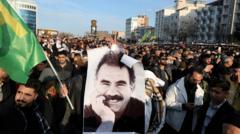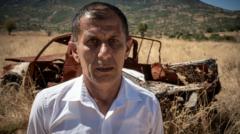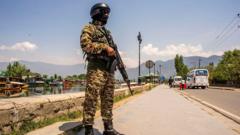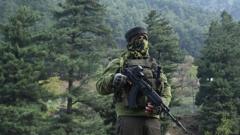In a historic move, the PKK, an outlawed group involved in a 40-year conflict with Turkey, has announced it will lay down its arms. This decision follows a recent call from its jailed leader, Abdullah Ocalan, urging for disbandment in light of democratic considerations. The PKK, classified as a terrorist organization in Turkey and Western nations, has transitioned from seeking independence for Kurds to advocating for greater autonomy and rights. The announcement comes on the heels of a letter from Ocalan, who has been incarcerated since 1999, emphasizing the need for democracy over militancy.
Kurdish PKK Announces Disbandment Amid New Political Climate

Kurdish PKK Announces Disbandment Amid New Political Climate
The Kurdish militant group PKK has officially declared its decision to disarm and disband, signaling a potential shift in the political landscape in Turkey.
The conflict between the PKK and the Turkish state has resulted in over 40,000 deaths, but recent military setbacks for the PKK and political dynamics ahead of Turkey's forthcoming presidential election in 2028 have prompted both sides to seek resolution. Ocalan's disbandment plea raised questions on potential political concessions, with Kurdish politicians hoping the move can pave the way for dialogue.
Commentators suggest the disbandment could lead to a more stable political environment in Turkey, contingent upon the government's responsiveness to demands for Kurdish rights. Observers note the recent "goodwill" from Turkish officials, yet skepticism remains on whether it will result in substantial political reform to ensure Kurdish involvement in governance and civil society. As Turkey navigates this changing landscape, the future of Kurdish political engagement appears to hinge on the government's subsequent actions.
Commentators suggest the disbandment could lead to a more stable political environment in Turkey, contingent upon the government's responsiveness to demands for Kurdish rights. Observers note the recent "goodwill" from Turkish officials, yet skepticism remains on whether it will result in substantial political reform to ensure Kurdish involvement in governance and civil society. As Turkey navigates this changing landscape, the future of Kurdish political engagement appears to hinge on the government's subsequent actions.



















